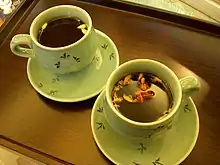 | |
| Type | Herbal tea |
|---|---|
| Country of origin | Korea |
| Ingredients | Jujubes |
| Korean name | |
| Hangul | 대추차 |
|---|---|
| Hanja | --茶 |
| Revised Romanization | daechu-cha |
| McCune–Reischauer | taech'u-ch'a |
| IPA | [tɛ.tɕʰu.tɕʰa] |
Daechu-cha (대추차) is a traditional Korean tea made from jujubes.[1] The tea is deep ruby-brown to rich dark maroon in color and is abundant in iron, potassium, and vitamins B and C.[2] It is often garnished with pine nuts.[3]
Preparation
There are two ways to make daechu-cha: boiling dried jujubes or diluting the preserved jujubes into boiling water.[2][4] Preserved jujubes can be made by simmering dried—preferably sun-dried—jujubes on low heat for about eight hours to a day, until the liquid becomes sweet and syrupy.[5] A pre-made sweet jujube syrup is also commercially available in Korean grocery stores.[6]
See also
References
- ↑ Won, Ho-jung (22 April 2016). "[Weekender] Healthful Korean tea to fit every need". The Korea Herald. Retrieved 20 August 2017.
- 1 2 Jung, Alex (13 July 2017). "Best Korean drinks -- from banana milk to hangover juice". CNN Travel. Retrieved 20 August 2017.
- ↑ Oh, Jean (18 February 2011). "Korean teas, not just green". The Korea Herald. Retrieved 17 May 2017.
- ↑ "Daechu-cha" 대추차. Doopedia (in Korean). Doosan Corporation. Retrieved 7 December 2009.
- ↑ Kim, Dakota (22 October 2015). "10 Strange and Wonderful Korean Teas". Paste. Retrieved 20 August 2017.
- ↑ Turiano, John Bruno (25 November 2014). "What The Heck Is A Jujube?". Westchester Magazine. Retrieved 20 August 2017.
This article is issued from Wikipedia. The text is licensed under Creative Commons - Attribution - Sharealike. Additional terms may apply for the media files.